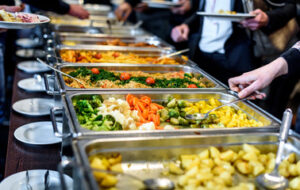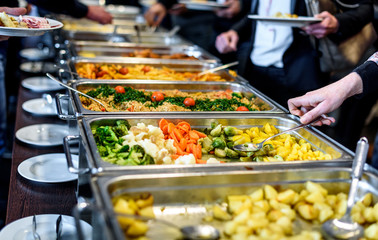Catering is a complex industry where culinary skills, event planning, and customer service all mingle. Join us as we take a closer look at this fascinating, multifaceted career.

Keep your costs low by choosing less expensive catering options like finger food, a veggie meal, or a self-serve buffet. You can also reduce expenses by using rented dinnerware or disposable items. Visit https://www.pyramidcatering.com/ to learn more.
Catering is a complex business that requires careful planning and attention to detail. Whether it is for a wedding, a corporate event, or a community gathering, there are many moving parts to manage. Developing a catering business plan can help you set goals and achieve success in this rewarding industry. Taking the time to consider your objectives, establishing a budget, and creating a unique menu for guests are all essential steps in planning a successful catering event.
Establishing a clear mission statement can help you stand out from the competition and build loyal customers. This statement should capture what your business is all about and make it distinct from other catering services. Market research can also help you avoid costly mistakes and tailor a unique value proposition for your catering business.
Cost control is critical for the catering industry, as profit margins can be thin. Keeping track of overhead costs and preventing food wastage is vital to the profitability of your catering business. In addition to this, it is important to manage food inventory carefully. Regular inventory checks can prevent theft and reduce waste, while ensuring that your menu items remain fresh and appealing to your clients.
The best way to ensure a smooth catering event is to clearly communicate with your clients and staff. Using texting threads and emails can help you keep everyone informed about changes in schedules and expectations. This can save you a lot of headaches and stress.
Choosing the right venue is a crucial element in the catering process. The size and layout of the space will determine how many people can be accommodated and what type of service is offered. For example, if you are serving a sit-down dinner, the venue should be large enough to hold all of your guests comfortably. In addition, the venue should be able to provide audio-visual equipment and lighting. Additionally, it should be convenient for your staff to access the kitchen and storage areas. For catering companies, it is also helpful to have a software program that allows you to lay out an entire event in 3D. The client services department at Joel uses a program called Room Viewer to create a virtual map of an event, including buffet tables, seating arrangements, and floral displays. This program is also useful for coordinating with vendors and scheduling delivery times.
Cooking
If you’ve attended a wedding reception, fundraising dinner, birthday party or bar mitzvah and enjoyed a beautifully prepared and presented meal, chances are the food was catered. Caterers prepare and serve meals at remote locations, such as hotel ballrooms, private homes, offices, stadiums or events centers. They also provide a full range of related services, such as beverage service and event planning.
One of the primary challenges for catering businesses is preparing and serving large volumes of food at short notice. In addition, caterers must meet strict dietary guidelines and food safety regulations. Choosing the right cooking equipment and supplies is critical to ensuring successful catering operations. Caterers also must manage budgets and schedules while balancing seasonal fluctuations in business.
When planning a menu, caterers must consider the number of guests and their individual dietary needs. They must also take into account any special requests from guests or the host, such as vegetarian options. If a caterer has access to a commercial kitchen, they may be able to save time and money by preparing food in advance.
Another benefit of catering is the ability to add a personal touch to a meal. Homemade dishes can help create a more intimate feel at a wedding or other event, and they can often be more cost-effective than purchasing food from a restaurant. Depending on the type of event, a caterer can also customize a menu to match its theme or showcase a specific culinary skill.
In order to succeed as a caterer, it is essential to have the right training and experience. An ICI course is a great way to build your skills and gain the industry recognition you need to start or grow your career in catering. This flexible learning programme can be accessed from anywhere in the world and is supported by a tutor to ensure you receive all of the guidance you need. Click on one of our Enrol Now buttons and you could be working towards a new career in catering within days. The sooner you get started, the faster you’ll be able to achieve your goals!
Serving
The catering process encompasses the planning, creation, and delivery of food for clients. Its unique facets include adapting to new locations, customizing services for diverse events, and managing the logistics of serving outside the confines of a fixed restaurant environment. A caterer’s business success depends on a combination of culinary skills, event planning knowledge, and customer service savvy. To succeed in this challenging industry, entrepreneurs should take the time to carefully research their target audience and competitive landscape. This will help them craft a unique brand identity and implement effective marketing strategies.
When starting a catering business, it is important to have a well-planned budget. This will help you estimate the startup costs and determine how long it will take for your venture to become profitable. In addition, it is also crucial to identify your ideal clientele and tailor your offerings to their needs. For example, if you are targeting corporate events, you may want to offer a more formal menu. On the other hand, if you are targeting local community gatherings, you may want to use a more homely design.
To streamline your operations, consider using a catering software solution. This will automate many processes and save you both time and money. For instance, it will allow you to create customized menus, track inventory, and manage your financials with a single platform. Additionally, it will help you automate deliveries and provide your customers with real-time updates and tracking.
As a caterer, you need to have reliable, skilled, and committed staff members. This is particularly important because the industry often requires long and irregular hours. Invest in training programs to ensure that your team is up-to-date with the latest culinary trends and has the tools they need to deliver exceptional customer service.
The catering industry is an exciting and rewarding career. It requires a high level of creativity and problem-solving, but it is also a lucrative industry with ample opportunities for growth. By putting in the effort to understand your target audience and developing effective marketing strategies, you can ensure the success of your catering business.
Cleaning
After the event, it’s time for the catering team to break down all of the equipment and tables. The team cleans and washes supplies, wraps glassware and silverware, and identifies rented items to return to the rental agency. This is a meticulous process that requires the team to follow the original packing list exactly.
Cleaning is a critical step in catering because it keeps surfaces and equipment safe from microorganisms that could potentially contaminate food. Stringent surface cleaning protocols must be adhered to, which is why the catering industry uses mops, chemicals and wipes that are proven to clean and sanitise effectively. When staff members finish a pack of wipes or a bottle of cleaning product, they should immediately replace them so that cleaning can continue uninterrupted.

